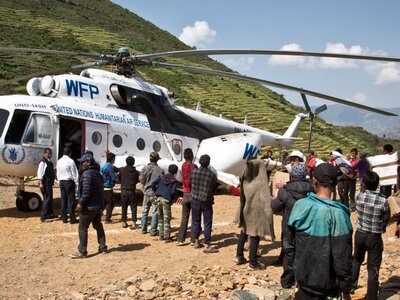Humanitarian support and services
- 1,200
- local and international organizations supported with WFP humanitarian services in 2022
- 390,000
- passengers transported by UNHAS in 2022
- US$84.1 million worth
- of relief items and support equipment sent to 135 countries and territories by UNHRD
As armed conflicts, mass displacement, and disasters take an ever heavier toll, humanitarian intervention remains a cornerstone of global governance. Over six decades spent battling crises, the World Food Programme (WFP) has accrued vast expertise and capacity in supply chain, engineering and emergency telecommunications – often in the most challenging environments. This experience affords WFP the ability to extend its capacity to also support emergency preparedness and medium-long term development efforts, depending on the local context.
In the face of tight funding and high expectations of efficiency, the humanitarian community is increasingly required to act in sync, streamline processes and pool resources. Working closely with private sector partners, WFP is making assets and functionalities available to fellow humanitarian operators, allowing them to save more lives, faster, and at lower cost to donors and the environment.
Thanks to WFP’s global demand for food, goods and services, we are able to offer competitive market rates, timely delivery, and cost efficiencies for our partners.
In addition, WFP leads the Logistics Cluster and the Emergency Telecommunications Cluster (ETC), and co-leads the Food Security Cluster. As lead agency, WFP coordinates responses to large-scale emergencies on behalf of the wider humanitarian community. The Logistics Cluster and ETC facilitate access to shared logistics and telecommunication services. The Food Security Cluster coordinates the food security response during a humanitarian crisis, addressing issues of food availability, access and utilisation.
Services provided by WFP on behalf of UN agencies, NGOs and government institutions
-
Procurement of food, relief items, and operational equipment
-
Special nutritious food for children, water and sanitation items, mobile warehouses, vehicles, and emergency telecommunications equipment: these are examples of items that WFP can procure for partners.
-
Emergency stockpiling and pre-positioning
-
Cargo transportation
-
Telecommunications and IT services
-
Air passenger transport
-
Warehousing and handling
-
Engineering support
-
Medical wellness and accommodation services







